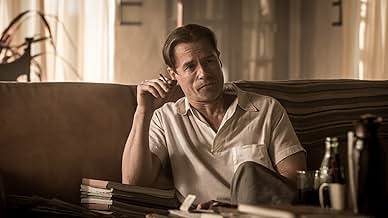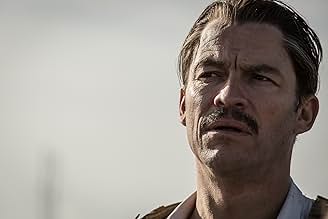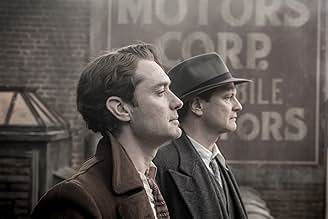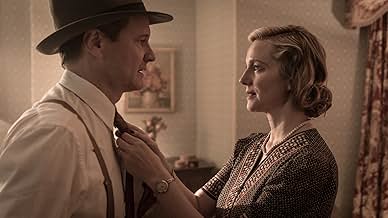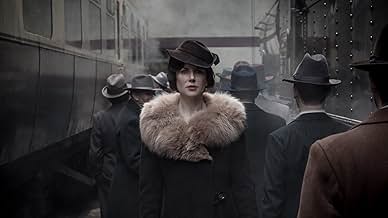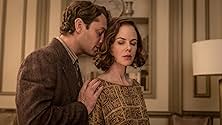IMDb-BEWERTUNG
6,5/10
22.289
IHRE BEWERTUNG
Eine Chronik über Max Perkins' Zeit als Lektor bei Scribner, wo er unter anderen Thomas Wolfe, Ernest Hemingway und F. Scott Fitzgerald betreute.Eine Chronik über Max Perkins' Zeit als Lektor bei Scribner, wo er unter anderen Thomas Wolfe, Ernest Hemingway und F. Scott Fitzgerald betreute.Eine Chronik über Max Perkins' Zeit als Lektor bei Scribner, wo er unter anderen Thomas Wolfe, Ernest Hemingway und F. Scott Fitzgerald betreute.
- Auszeichnungen
- 1 Gewinn & 6 Nominierungen insgesamt
Angela Sant'Albano
- Bertha Perkins
- (as Angela Ashton)
Ray Strasser King
- James, Mailroom Clerk
- (as Ray Strasser-King)
Empfohlene Bewertungen
It's a movie about Thomas Wolfe and Max Perkins, with four great actors: Colin Firth as Perkins, sporting a New England accent with overtones of having studied in England; Jude Law as Wolfe, sporting a generic Southern accent; Laura Linney as Mrs. Perkins and the always welcome Nicole Kidman as Wolfe's mistress. It's acting pyrotechnics time and extremely satisfying.
I find it hard to understand how this excellent film is getting negative reviews from critics. It is like a breath of fresh air for thinking movie goers. It is a thoughtful, intelligent and highly entertaining look at Maxwell Perkins, an editor who as he said wanted to bring "good books" to the public. He did, bringing us the works of Fitzgerald, Hemingway and Thomas Wolfe who is the focus of the film. It gives a historical perspective of two opposites (Perkins and Wolfe) who working together create something substantial. Perkins is a strong main character with a noble moral center, beautifully underplayed by Firth. When did we last see someone acting nobly in a film? In contrast, to the larger than life and decadent Wolfe (I had no idea Wolfe was played by Jude Law, until after the film) Law immerses himself in the character. The fact that this is a true story makes it all the more compelling. My fifteen year old daughter who is well versed in the writings of both Fitzgerald and Hemingway encouraged me to see Genius. We both walked away exhilarated; the way you feel after seeing a really good movie that transported you somewhere else. The Director, writer, actors and composer/ scorer all did a first rate job to help bring a to bring a great film to the public.
A bunch of great actors portraying a bunch of great writers (plus a publicist, though that would be an understatement for the role he played). As you can imagine the acting is superb, male and female talent have a lot to bite and chew off with their roles. The dialog is great and I was surprised this didn't do better or was promoted better (at least in Germany).
Then again it's not an easy watch, what with lots of dialog and drama. But the tension it builds (especially concerning the relationships of the characters within) is really great. Flaws are here to be exposed and the actors cherish them, playing them perfectly. It's a period piece and therefor may interest some people more than others. But if you like good drama, you could do worse
Then again it's not an easy watch, what with lots of dialog and drama. But the tension it builds (especially concerning the relationships of the characters within) is really great. Flaws are here to be exposed and the actors cherish them, playing them perfectly. It's a period piece and therefor may interest some people more than others. But if you like good drama, you could do worse
7vsks
Director Michael Grandage's movie Genius about the relationship between legendary Scribners editor Maxwell Perkins and flamboyant author Thomas Wolfe has received generally tepid reviews. I for one am delighted an editor is finally receiving some screen time! Wolfe was an author whose moods, enthusiasms, and output were not easily corralled, even by someone with Perkins's experience. After all, he'd brought works to the public from other outsized personalities and authors with personal difficulties—notably Ernest Hemingway and F. Scott Fitzgerald.
It's easy to imagine the slammed door that would greet an author today who showed up with a 5,000-page manuscript as Wolfe did with his second book, Of Time and the River. The challenging task of turning this into a readable manuscript epitomizes the editor's dilemma, as Perkins puts it, "Are we really making books better, or just making them different?" Getting 5,000 pages down to a still-hefty 900 made it different, all right. And better, at least in the sense of more likely to be read, too.
Colin Firth, as Perkins, keeps his hat on during almost the entirety of the movie, symbolic perhaps of how his character tried to keep a lid on his difficult author. Jude Law as Wolfe is by turns outrageous, contrite, drunk, and sentimental. Pretty much like the novels, actually. His performance is consistent and always interesting. He shows Wolfe as a man with a lot of words bottled up inside him who couldn't always control the way they poured out.
It's odd to see an all-British and Australian cast playing so many titans of American literary history, including Perkins and Wolfe, Guy Pearce as Fitzgerald, and Dominic West as Hemingway. (The Hemingway scene necessitated an ending credit for "marlin fabricator.") The women in the lives of the protagonists are Laura Linney as Mrs. Perkins, perfect as always, and Nicole Kidman, who believably portrays the obsessed Mrs. Bernstein. She's left her husband to cultivate and promote the much younger Wolfe and is not lacking a flair for the dramatic herself.
The movie is based on the National Book Award-winning Perkins biography by A. Scott Berg, transformed into a screenplay by John Logan. New Yorker critic Richard Brody dings the script for its departures from the detailed and more richly peopled original, including the book's fuller explanation for the rupture between Wolfe and Scribners. While I disagree with some critiques of the filmed story, Brody says a lawsuit and Wolfe's unsavory political views played a part, and leaving the latter out seems a mistake. A fuller exploration of the break-up could have put some meat on the bones.
Portraying in cinema an intrinsically intellectual and abstract enterprise is difficult (The Man Who Knew Infinity struggled with the same challenge.) Like me, reviewer Glenn Kenny at Roger Ebert.com apparently had not read the book, so did not have Brody's reservations. Kenny found "the exchanges between editor and author exhilarating. Logan's script . . . is invested in the craft of words like few other movies nowadays, even those ostensibly about writers." Wolfe blasted onto the American literary scene like a runaway train and left it before he could accomplish a judicious application of the brakes. Yet, he eventually realized who'd kept him on track, as his moving deathbed letter attests.
It's easy to imagine the slammed door that would greet an author today who showed up with a 5,000-page manuscript as Wolfe did with his second book, Of Time and the River. The challenging task of turning this into a readable manuscript epitomizes the editor's dilemma, as Perkins puts it, "Are we really making books better, or just making them different?" Getting 5,000 pages down to a still-hefty 900 made it different, all right. And better, at least in the sense of more likely to be read, too.
Colin Firth, as Perkins, keeps his hat on during almost the entirety of the movie, symbolic perhaps of how his character tried to keep a lid on his difficult author. Jude Law as Wolfe is by turns outrageous, contrite, drunk, and sentimental. Pretty much like the novels, actually. His performance is consistent and always interesting. He shows Wolfe as a man with a lot of words bottled up inside him who couldn't always control the way they poured out.
It's odd to see an all-British and Australian cast playing so many titans of American literary history, including Perkins and Wolfe, Guy Pearce as Fitzgerald, and Dominic West as Hemingway. (The Hemingway scene necessitated an ending credit for "marlin fabricator.") The women in the lives of the protagonists are Laura Linney as Mrs. Perkins, perfect as always, and Nicole Kidman, who believably portrays the obsessed Mrs. Bernstein. She's left her husband to cultivate and promote the much younger Wolfe and is not lacking a flair for the dramatic herself.
The movie is based on the National Book Award-winning Perkins biography by A. Scott Berg, transformed into a screenplay by John Logan. New Yorker critic Richard Brody dings the script for its departures from the detailed and more richly peopled original, including the book's fuller explanation for the rupture between Wolfe and Scribners. While I disagree with some critiques of the filmed story, Brody says a lawsuit and Wolfe's unsavory political views played a part, and leaving the latter out seems a mistake. A fuller exploration of the break-up could have put some meat on the bones.
Portraying in cinema an intrinsically intellectual and abstract enterprise is difficult (The Man Who Knew Infinity struggled with the same challenge.) Like me, reviewer Glenn Kenny at Roger Ebert.com apparently had not read the book, so did not have Brody's reservations. Kenny found "the exchanges between editor and author exhilarating. Logan's script . . . is invested in the craft of words like few other movies nowadays, even those ostensibly about writers." Wolfe blasted onto the American literary scene like a runaway train and left it before he could accomplish a judicious application of the brakes. Yet, he eventually realized who'd kept him on track, as his moving deathbed letter attests.
GENIUS is the name attached to John Logan's screen lay adaptation of A. Scott Berg's 1979 novel 'Max Perkins: Editor of Genius' and Michael Granage directs a superlative cast in this recreation of the Depression of the 1930s America. Despite the fact that the film focuses on the raucous life of Thomas Wolfe, the true remarkable character throughout is Max Perkins – the editor at Scribner's in New York City who is responsible for the editing of the books of not only Wolfe but also of Ernest Hemingway and F. Scott Fitzgerald.
The film plays the period well opening in 1929 when writer Thomas Wolfe (Jude Law), decided to keep the appointment made by Max Perkins (Colin Firth), editor at Scribner's, he had no illusions: his manuscript would be turned down as had invariably been the case. But, to his amazement, his lengthy autobiographical novel 'O Lost', which was to become "Look Homeward, Angel" was accepted for publication. The only trouble was that it was overlong (5,000 pages) and had to be reduced. Although reluctant to see his poetic prose trimmed, Wolfe agreed and helped by Perkins, who had become a true friend, managed to cut 90,000 words from the book, with the result that it instantly became a favorite with the critics and bestseller. Success was even greater in 1935 when "Of Time end the River" appeared but Wolfe's inability to cope with the editing process got in the way of his relationship with his mistress (Nicole Kidman) and with Max, and Wolfe died in 1938 after writing 'You Can't Go Home Again', 'The Web and the Rock' and some short stories. Wolfe remained faithful to his appreciation for Max Perkins and died from tuberculosis of the brain a lonely man at age 38.
The supporting cast is superb – Laura Linney as Louis Perkins, Guy Pearce as F. Scott Fitzgerald, Dominic West as Ernest Hemingway – and both Law and Firth carry the story well, maintaining a credible relationship in all its stages. Unfortunately the ending of the film is gushingly saccharine – not at all a good choice. But the movie is a tasty bit of acting and history and deserves to be seen.
The film plays the period well opening in 1929 when writer Thomas Wolfe (Jude Law), decided to keep the appointment made by Max Perkins (Colin Firth), editor at Scribner's, he had no illusions: his manuscript would be turned down as had invariably been the case. But, to his amazement, his lengthy autobiographical novel 'O Lost', which was to become "Look Homeward, Angel" was accepted for publication. The only trouble was that it was overlong (5,000 pages) and had to be reduced. Although reluctant to see his poetic prose trimmed, Wolfe agreed and helped by Perkins, who had become a true friend, managed to cut 90,000 words from the book, with the result that it instantly became a favorite with the critics and bestseller. Success was even greater in 1935 when "Of Time end the River" appeared but Wolfe's inability to cope with the editing process got in the way of his relationship with his mistress (Nicole Kidman) and with Max, and Wolfe died in 1938 after writing 'You Can't Go Home Again', 'The Web and the Rock' and some short stories. Wolfe remained faithful to his appreciation for Max Perkins and died from tuberculosis of the brain a lonely man at age 38.
The supporting cast is superb – Laura Linney as Louis Perkins, Guy Pearce as F. Scott Fitzgerald, Dominic West as Ernest Hemingway – and both Law and Firth carry the story well, maintaining a credible relationship in all its stages. Unfortunately the ending of the film is gushingly saccharine – not at all a good choice. But the movie is a tasty bit of acting and history and deserves to be seen.
Wusstest du schon
- WissenswertesA. Scott Berg's biography "Max Perkins: Editor of Genius", on which the film is based, won the National Book Award in 1978.
- PatzerMaxwell Perkins tells Thomas Wolfe his book needs a new title that will appeal to potential purchasers, and gives the example of F. Scott Fitzgerald changing the title of a novel from "Trimalchio in West Egg" to "The Great Gatsby." The real Perkins, as Fitzgerald's editor, certainly would have known that "The Great Gatsby" was a flop upon its release in 1925 and did not sell well until the 1950s.
- Zitate
Aline Bernstein: I don't exist anymore. I've been edited.
- Crazy CreditsThe title "Genius" appears on the screen 9 minutes into the movie.
- SoundtracksFlow Gently Sweet Afton
(Sottish traditional)
Composed by Jonathan E. Spillman
(1873)
Performed by London Voices
Top-Auswahl
Melde dich zum Bewerten an und greife auf die Watchlist für personalisierte Empfehlungen zu.
- How long is Genius?Powered by Alexa
Details
- Erscheinungsdatum
- Herkunftsländer
- Offizielle Standorte
- Sprachen
- Auch bekannt als
- Pasión por las letras
- Drehorte
- Produktionsfirmen
- Weitere beteiligte Unternehmen bei IMDbPro anzeigen
Box Office
- Bruttoertrag in den USA und Kanada
- 1.361.045 $
- Eröffnungswochenende in den USA und in Kanada
- 98.274 $
- 12. Juni 2016
- Weltweiter Bruttoertrag
- 7.435.006 $
- Laufzeit
- 1 Std. 44 Min.(104 min)
- Farbe
- Sound-Mix
- Seitenverhältnis
- 2.35 : 1
Zu dieser Seite beitragen
Bearbeitung vorschlagen oder fehlenden Inhalt hinzufügen







